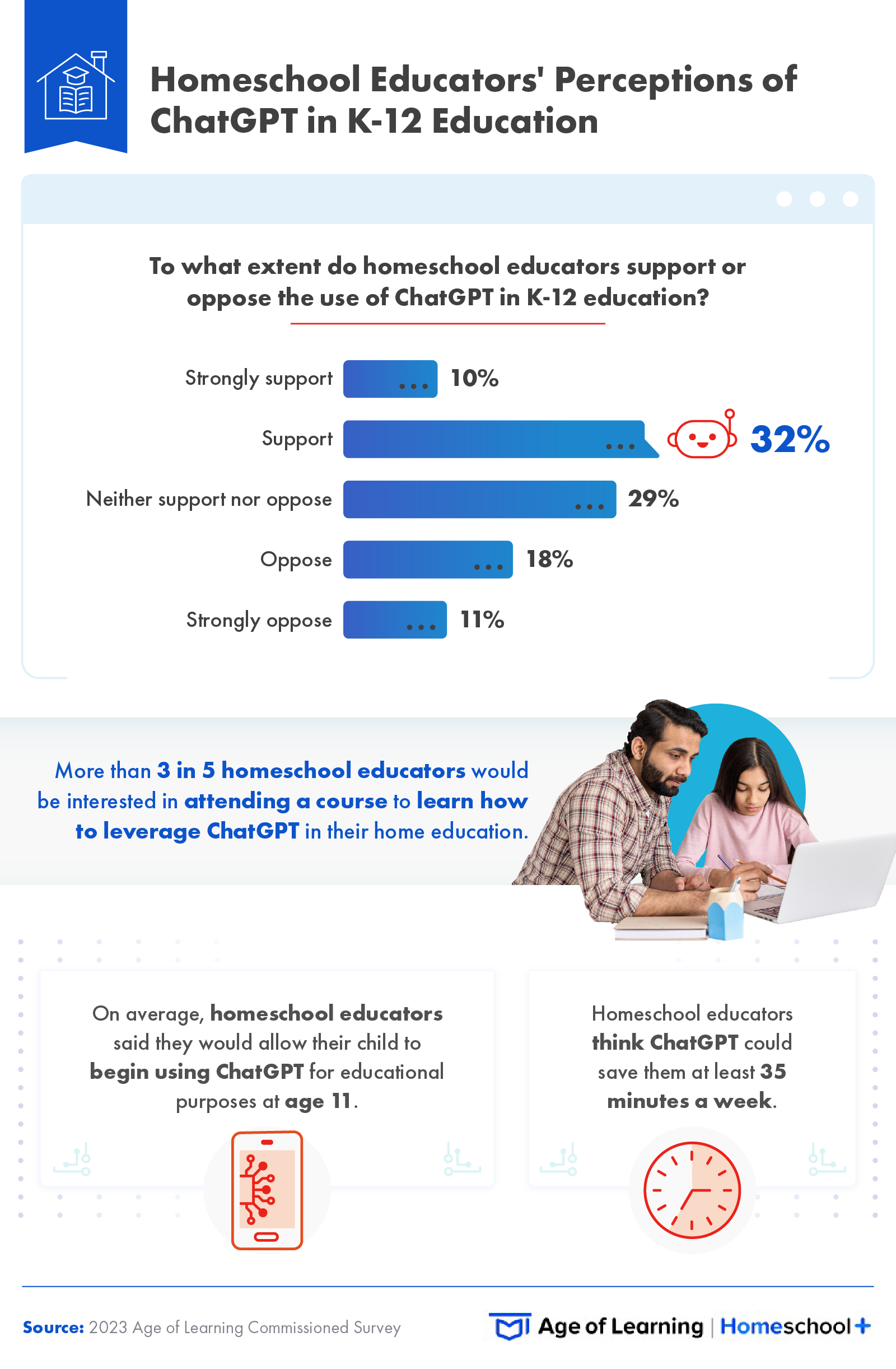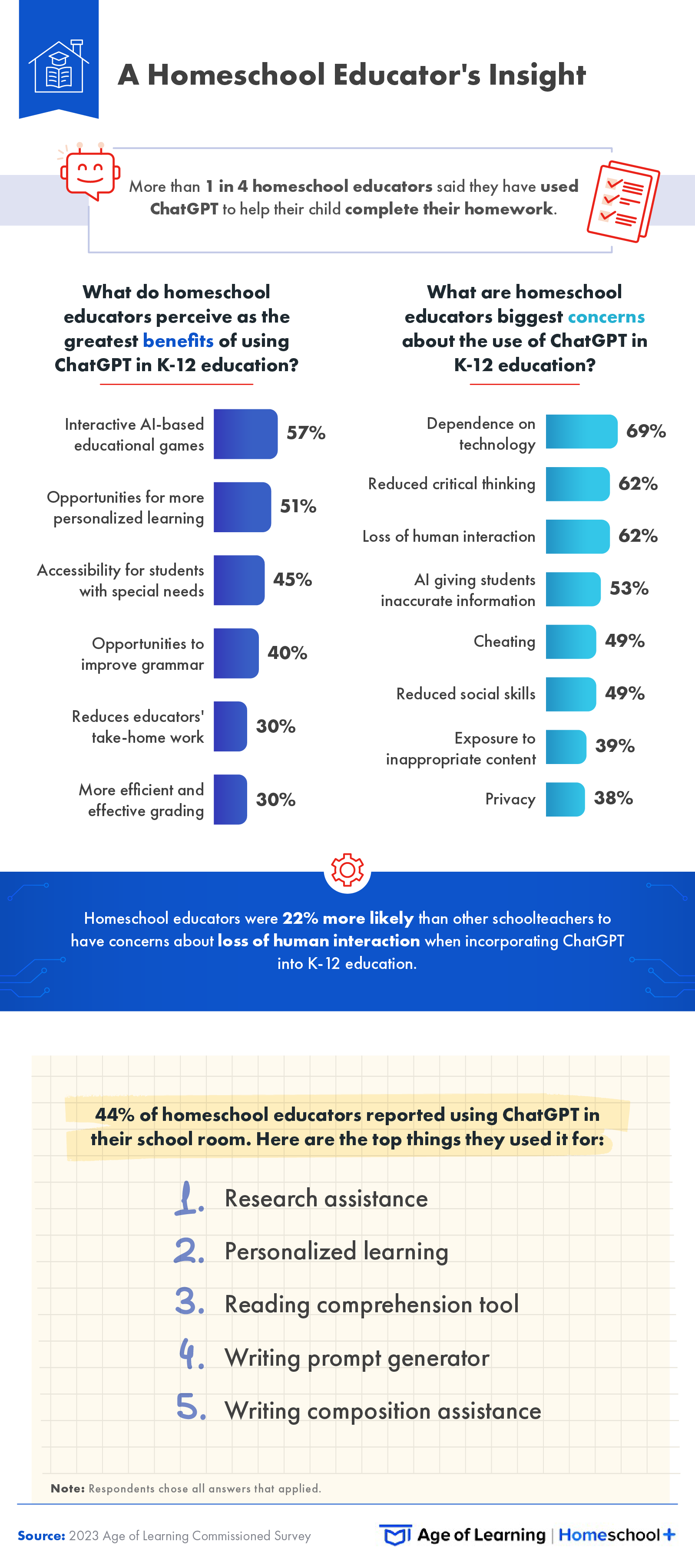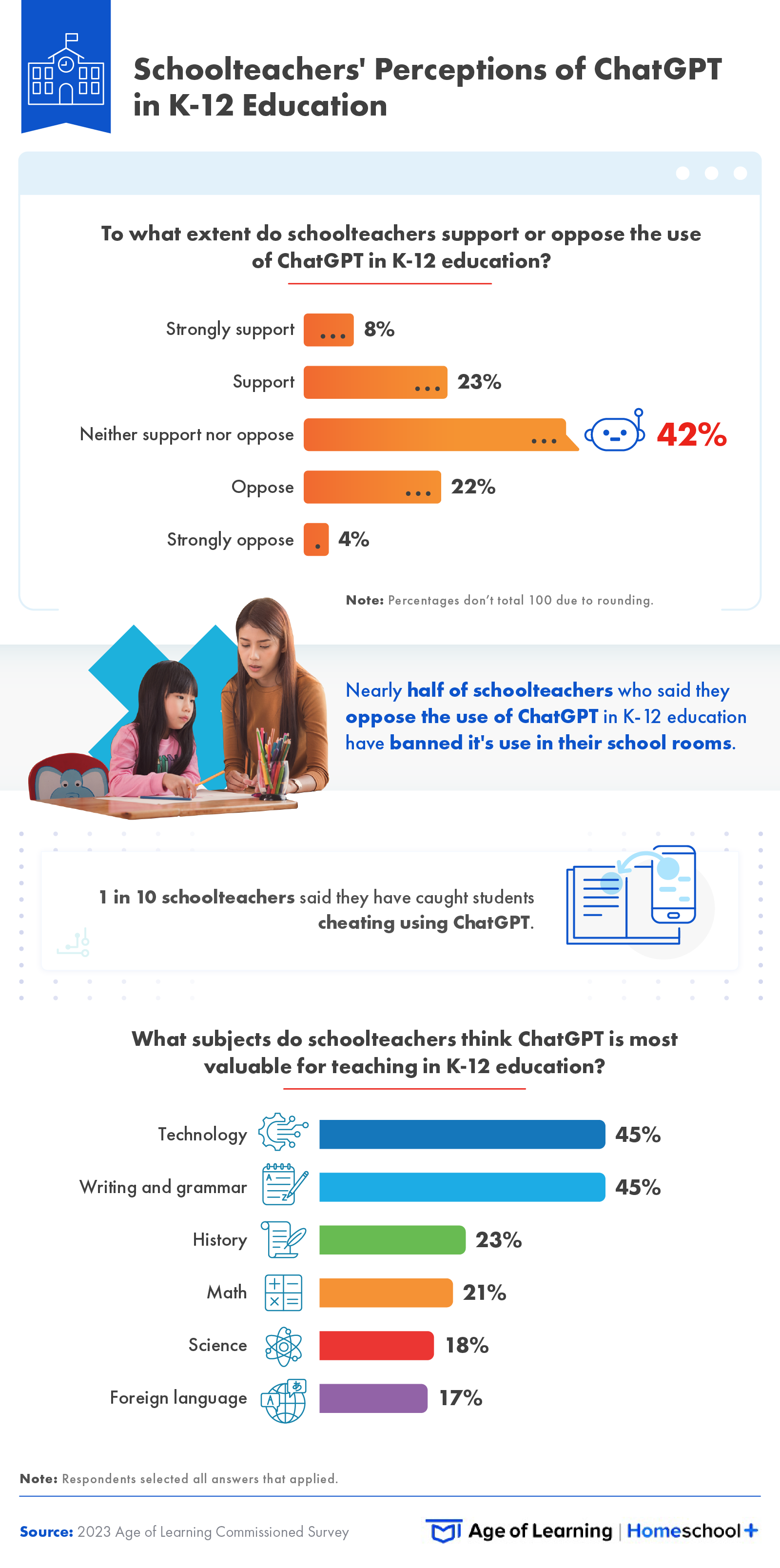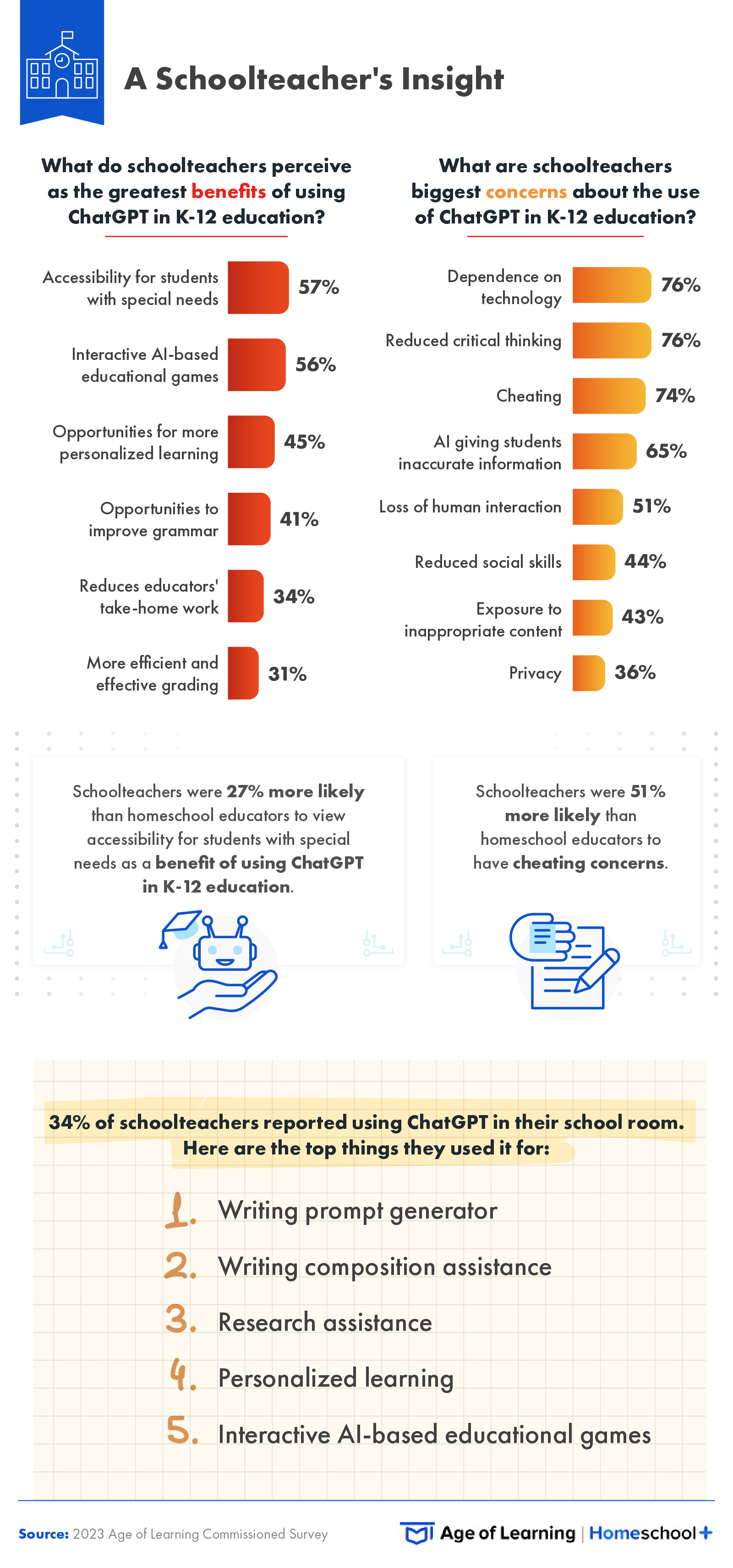How Educators Feel about ChatGPT

Key Takeaways
- Homeschool educators are 35% more likely than schoolteachers to support using ChatGPT in K-12 education.
- 44% of homeschool educators and 34% of schoolteachers use ChatGPT in their school rooms.
- Schoolteachers (69%) and homeschool educators (68%) believe using ChatGPT will prepare children for technology-based careers.
- Over 1 in 4 homeschool educators said they have used ChatGPT to help their child complete their homework.
- On average, homeschool educators would allow their child to begin using ChatGPT for educational purposes at age 11.
- 1 in 10 schoolteachers have caught students cheating using ChatGPT.
- Schoolteachers believe the No. 1 benefit of using ChatGPT in K-12 education is accessibility for students with special needs (57%).
Is Artificial Intelligence a Smart Choice for Schools?
Once a SciFi trope, AI is now part of daily life. One of these latest technologies is ChatGPT, a chatbot providing human-like responses to nearly any question.
Whether you need macroeconomics help or to compare and contrast the characteristics of literary heroines Jane Eyre and Anna Karenina, ChatGPT will give you a detailed answer in easy-to-understand terms. But ChatGPT, and other AI products can also write a flawless essay any English teacher might believe a student wrote. This has raised concerns among the education community and some school districts have even banned the software.
To explore teachers’ thoughts on using ChatGPT in K-12 education, we commissioned an online survey of 253 home educators and 192 schoolteachers about whether it’s helpful or problematic and why. Our results below answer these questions and share ways to optimize the use of ChatGPT for K-12 students in today’s rapidly evolving educational landscape.
ChatGPT in Home Education
Like all new technology, ChatGPT offers benefits and challenges when used in the real world. How do homeschool educators feel about ChatGPT: should it be used in homeschooling? If so, in what ways can this AI technology be helpful to them and their children?

Home educators were divided in their opinions on the use of ChatGPT in the classroom: 42% supported it, 29% opposed it, and 29% neither supported nor opposed it. However, over 95% of them had concerns about ChatGPT in K-12 education, indicating that even those who support using it may also have questions about its educational applications.
One of the biggest questions surrounding ChatGPT in education is how difficult it might be for home educators to identify AI-produced student work. One in three of them worried they wouldn’t be able to tell if their child had used ChatGPT to solve a math problem. These respondents were also concerned about being able to identify ChatGPT writing, especially essays; they were 39% more likely to be able to tell if their child used ChatGPT to write a short-answer question versus an essay.

Despite these concerns, 44% of homeschool educators used ChatGPT in their home schoolroom and felt it benefited them and their students, especially in the following ways:
- AI-based learning games (57%)
- Personalized learning (51%)
- Accessibility for special needs students (45%)
An impressive 68% also felt ChatGPT would prepare students for technology-based careers. And while opinions varied among these home educators, they were 35% more likely than schoolteachers to support using ChatGPT in K-12 education.
ChatGPT in School Room Education
With ChatGPT bans in several school districts, not all schoolteachers have had the opportunity to experiment with the technology in their classrooms. How do schoolteachers feel about this AI, and how are K-12 educators using it in their classrooms where it’s allowed?

When asked about using ChatGPT in class, 42% of schoolteachers neither supported nor opposed it, compared to just 29% of homeschool educators. But over half (57%) thought ChatGPT would improve accessibility for students with special needs, and some believed it would be useful for teaching technology (45%) and writing and grammar (45%).
The schoolteachers who were either neutral or opposed to using ChatGPT in school may not have had ample opportunity to fully explore its pros and cons due to bans on ChatGPT in some districts. But of those whose students have used it for their schoolwork, 1 in 10 have caught them cheating with it. That’s sure to give a teacher pause.

The potential for cheating is one reason why an overwhelming 98% of schoolteachers had concerns about using it in K-12 education. They were most concerned about greater student dependence on technology (76%) and reduced critical thinking (76%), but cheating took the No. 3 spot (74%). This explains why ChatGPT was also less common among schoolteachers (34%) than home educators (44%).
Though schoolteachers may be rightly concerned about ChatGPT in education, they also see its potential benefits. In fact, 69% of them believed it could prepare students for technology-based careers—nearly the same percentage as homeschool educators.
Schoolteachers also see how ChatGPT can help them prepare for and manage their classrooms. Teachers in K-12 classrooms can use ChatGPT to generate writing prompts, help grade assignments, and reduce their overall take-home workload. ChatGPT can benefit educators even if students never use the technology in class.
The Educational Possibilities of ChatGPT and Future Technology
Technology advancements continue to inspire moral dilemmas, and ChatGPT is no exception. Schoolteachers and home educators alike see the benefits ChatGPT can have in K-12 education, including more personalized learning experiences for students, increased accessibility for special needs students, and professional assistance for teachers. But they also see the potential problems ChatGPT can cause in the classroom, including cheating and a reduced capacity for critical thinking.
To truly understand how ChatGPT functions in education, teachers need access to it. As they experiment with ChatGPT in school, they can find areas where it improves the educational experience. School room use will also allow teachers to identify areas where ChatGPT falls short in education. They can then adjust their teaching methods, brainstorm creative solutions, and even provide feedback to programmers to improve the AI tool’s functionality.
Districts and educators can embrace new technologies while being rationally aware of their inevitable shortcomings. Technology has already changed many aspects of K-12 education; if we remain open to its possibilities, technology can make education more accessible, engaging, and enriching for all students.
Methodology
To explore perceptions about the use of ChatGPT in K-12 education, we commissioned an online survey of 253 homeschool educators and 192 schoolteachers.
About Homeschool+
We support you, the home educator, in creating a customized learning environment where you and your children can thrive and their love of learning and academic success shines. Homeschool+ curricula include fully adaptive math and reading programs for children ages 4-8, plus 12 online courses covering art, science, social studies, and more, along with robust home educator tools that support your unique homeschool.
Fair Use Statement
Are you a home educator or schoolteacher experimenting with ChatGPT? Feel free to share this article with anyone you’d like. We just ask that you do so for non-commercial purposes only and provide a link back to this page to give the authors their due credit.